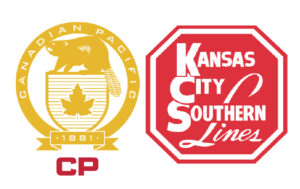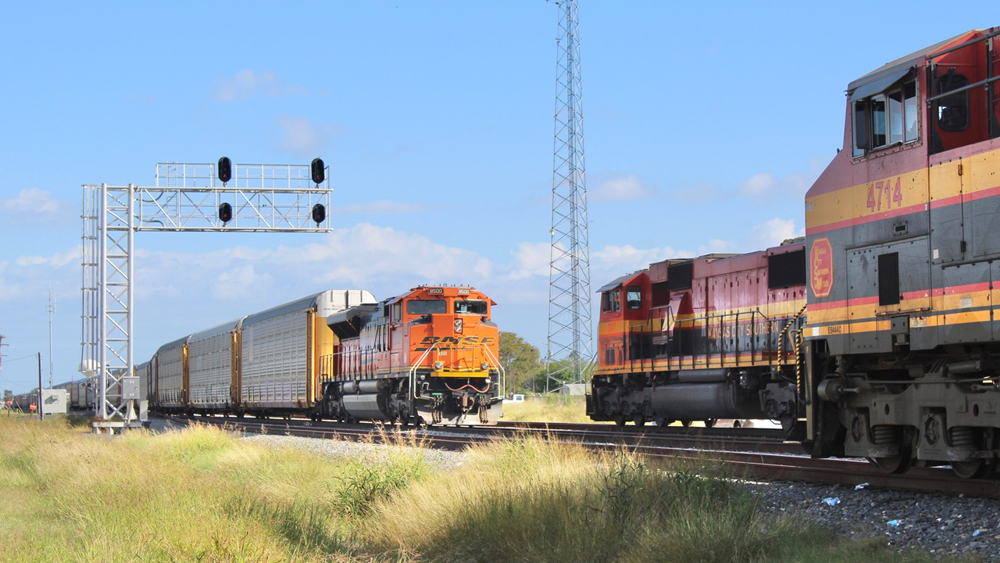
Canadian Pacific-Kansas City Southern merger to face environmental review
By Bill Stephens | November 12, 2021
Projected increase in train traffic prompts regulatory decisio
WASHINGTON – Canadian Pacific and Kansas City Southern will have to study the environmental impacts of their proposed merger, the Surface Transportation Board said today.
The railways will have to prepare an environmental impact statement partly due to projected increases in rail traffic on several line segments, most notably on CP’s former Milwaukee Road line from Sabula, Iowa, to Kansas City, Mo., the board said in its decision.
The board’s office of environmental analysis will host six online public scoping meetings from Nov. 30 to Dec. 9 to hear feedback from the public, communities, state and local agencies, and environmental groups regarding the potential impact of the merger.
A projected rise in rail traffic in CPKC lines was among the factors that triggered the need for an environmental review, the board said. The threshold for an environmental review is a 100% increase in gross ton miles over a particular line segment or an increase of at least eight trains per day.
CPKC main lines in Illinois, Iowa, Missouri, Kansas, Oklahoma, Arkansas, Louisiana, and Texas would exceed the threshold, the STB noted.
The environmental review must be completed before the board issues a decision on the merger.
Projected increase in train traffic prompts regulatory decisio
WASHINGTON – Canadian Pacific and Kansas City Southern will have to study the environmental impacts of their proposed merger, the Surface Transportation Board said today.
The railways will have to prepare an environmental impact statement partly due to projected increases in rail traffic on several line segments, most notably on CP’s former Milwaukee Road line from Sabula, Iowa, to Kansas City, Mo., the board said in its decision.
The board’s office of environmental analysis will host six online public scoping meetings from Nov. 30 to Dec. 9 to hear feedback from the public, communities, state and local agencies, and environmental groups regarding the potential impact of the merger.
A projected rise in rail traffic in CPKC lines was among the factors that triggered the need for an environmental review, the board said. The threshold for an environmental review is a 100% increase in gross ton miles over a particular line segment or an increase of at least eight trains per day.
CPKC main lines in Illinois, Iowa, Missouri, Kansas, Oklahoma, Arkansas, Louisiana, and Texas would exceed the threshold, the STB noted.
The environmental review must be completed before the board issues a decision on the merger.
BNSF and CN raise issues over CP-KCS merger
BNSF seeks more time regarding Mexico traffic; CN claims merger application filed too early

BNSF seeks more time regarding Mexico traffic; CN claims merger application filed too early

A train of auto racks with BNSF power meets Kansas City Southern locomotives at Robstown, Texas. BNSF is asking the Surface Transportation Board for more time to consider the impact of the CP-KCS merger on U.S.-Mexico rail traffic. (Bill Stephens)
WASHINGTON – BNSF Railway and Canadian National have raised issues with federal regulators’ timeline for review of the proposed Canadian Pacific-Kansas City Southern merger.
BNSF, in a filing posted today on the Surface Transportation Board’s website, said the 90-day comment period was insufficient given the ramifications of how the merger would affect traffic moving between the U.S. and Mexico.
The CP-KCS combination will create the first railroad to link Canada, the U.S., and Mexico. KCS is an important interchange partner for BNSF traffic moving over the Laredo, Texas, gateway, the busiest rail border crossing in North America.
“Notwithstanding the central importance of Mexico to the proposed transaction, the Application contains virtually no analysis of market conditions in Mexico, competition in Mexico involving cross-border movements, commercial and regulatory factors governing rate-setting for the Mexican portion of these cross-border movements, or future regulatory conditions that will affect access to Mexico,” BNSF wrote. “Based on the information in the Application about competitive conditions in Mexico, it is impossible to assess potential harm to U.S. shippers that compete with Canadian shippers for movements into and out of Mexico, or to assess the impact of the proposed transaction on shippers located on different U.S. rail lines. As far as the Application is concerned, conditions in Mexico are in a black box.”
BNSF asked the board to extend the comment period by 60 days, with a 60-day extension of all following deadlines on the merger review schedule.
The additional time would allow BNSF, other parties, and the STB to fully evaluate the merger’s cross-border impact and help regulators determine whether conditions should be imposed to ensure that three KCS Texas interchange locations — Laredo, Robstown, and Brownsville — will remain open on “reasonable rate and service terms.”
“Absent such conditions, shippers may be forced to use less efficient and more costly routes, and BNSF’s ability to provide fully competitive service over those gateways to and from points in Mexico pursuant to the UP/SP merger conditions will be at risk,” BNSF wrote.
CN claims CP and KCS filed their merger application too early in an attempt to “short circuit the public interest review process.” Under STB guidelines, CP and KCS should have to wait until between Dec. 15 of this year and Feb. 15, 2022 to file their merger application, CN argues.
“Applicants’ rush to file an application in violation of the rules also has serious implications for the Board’s public interest review in this merger proceeding. For example, the Application projects that the proposed transaction would generate increased train volumes that exceed the Board’s environmental review thresholds over wide ranges of Applicants’ networks stretching from Laredo to Chicago,” CN wrote in its filing. “Yet the Application fails to address the potential consequences of such traffic shifts for affected communities or identify any planned mitigation.”
The board has since ordered CP and KCS to prepare an environmental impact study for their merger.
WASHINGTON – BNSF Railway and Canadian National have raised issues with federal regulators’ timeline for review of the proposed Canadian Pacific-Kansas City Southern merger.
BNSF, in a filing posted today on the Surface Transportation Board’s website, said the 90-day comment period was insufficient given the ramifications of how the merger would affect traffic moving between the U.S. and Mexico.
The CP-KCS combination will create the first railroad to link Canada, the U.S., and Mexico. KCS is an important interchange partner for BNSF traffic moving over the Laredo, Texas, gateway, the busiest rail border crossing in North America.
“Notwithstanding the central importance of Mexico to the proposed transaction, the Application contains virtually no analysis of market conditions in Mexico, competition in Mexico involving cross-border movements, commercial and regulatory factors governing rate-setting for the Mexican portion of these cross-border movements, or future regulatory conditions that will affect access to Mexico,” BNSF wrote. “Based on the information in the Application about competitive conditions in Mexico, it is impossible to assess potential harm to U.S. shippers that compete with Canadian shippers for movements into and out of Mexico, or to assess the impact of the proposed transaction on shippers located on different U.S. rail lines. As far as the Application is concerned, conditions in Mexico are in a black box.”
BNSF asked the board to extend the comment period by 60 days, with a 60-day extension of all following deadlines on the merger review schedule.
The additional time would allow BNSF, other parties, and the STB to fully evaluate the merger’s cross-border impact and help regulators determine whether conditions should be imposed to ensure that three KCS Texas interchange locations — Laredo, Robstown, and Brownsville — will remain open on “reasonable rate and service terms.”
“Absent such conditions, shippers may be forced to use less efficient and more costly routes, and BNSF’s ability to provide fully competitive service over those gateways to and from points in Mexico pursuant to the UP/SP merger conditions will be at risk,” BNSF wrote.
CN claims CP and KCS filed their merger application too early in an attempt to “short circuit the public interest review process.” Under STB guidelines, CP and KCS should have to wait until between Dec. 15 of this year and Feb. 15, 2022 to file their merger application, CN argues.
“Applicants’ rush to file an application in violation of the rules also has serious implications for the Board’s public interest review in this merger proceeding. For example, the Application projects that the proposed transaction would generate increased train volumes that exceed the Board’s environmental review thresholds over wide ranges of Applicants’ networks stretching from Laredo to Chicago,” CN wrote in its filing. “Yet the Application fails to address the potential consequences of such traffic shifts for affected communities or identify any planned mitigation.”
The board has since ordered CP and KCS to prepare an environmental impact study for their merger.
No comments:
Post a Comment